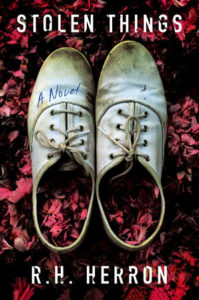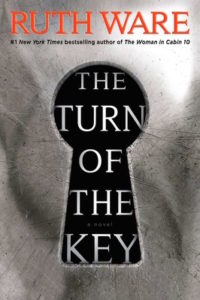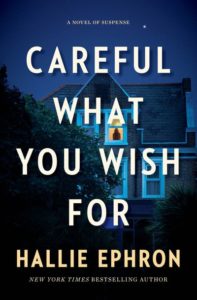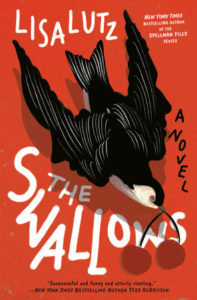August’s psychological suspense books take a close look at our relationship to possessions and our relationships period, worldly and otherwise. Hallie Ephron’s latest is about a personal organizer who tries to understand the psychology of why her clients need so many possessions. The thing stolen in R.H. Herron’s debut Stolen Things is a teenaged girl’s virginity—and her innocence. In Ruth Ware’s latest, a clever rewriting of Henry James’s classic supernatural story The Turn of the Screw, a nanny takes a job in the remote Scottish Highlands for a wealthy family with a smart house, the kind of place that keeps tabs on all of its residents and visitors. And in Robyn Harding’s The Arrangement, a young art student enters into a sugar daddy (or Pretty Woman) relationship with an older, married man, which takes a turn for the sinister when the young woman finds herself passionately in love with her paramour.
R.H. Herron, Stolen Things (Dutton)
Stolen Things comes at crime fiction from an unusual point of view: the narrator, Laurie Ahmadi, is a dispatcher in the close knit (fictional) town of San Bernal in northern California. Before she was a dispatcher, Ahmadi was a cop, so she knows the streets as well as she knows the desperate voices on the other end of a 911 call. Ahmadi is now married to the chief, and they have a teenaged daughter, Jojo, who has grown up in the department. So when Jojo is the victim of a sexual assault at the house of a young man active in protests against the department, the investigation naturally focuses on the activists. But there’s a twist: Jojo’s best friend has also disappeared and might be involved in a sex scandal within the department. Stolen is a book about sexual violence and coercion that never feels exploitive or less than empathetic.
Ruth Ware, Turn of the Key (Scout)
Ware’s latest is more than a subtle homage to Henry James’s chilling The Turn of the Screw. Ware has tools James could have only dreamt about—namely, technology that can track the members of affluent family of a secluded house in the Scottish Highlands has trouble keeping a nanny. Enter Rowan Caine, an experienced childminder running from her past. With the book narrated by Rowan from prison with one of the children dead, her troubles are far from over—though she insists she’s not guilty, her story is full of moments which reflect poorly on the beleaguered nanny. And if she didn’t commit the murder, who did?
Hallie Ephron, Careful What You Wish For (William Morrow)
Jumping on the Marie Kondo trend, Ephron’s heroine, Emily Harlow, is a personal organizer (also a pretty good way to get someone deep inside someone else’s life). Emily specializes in hoarders, and she knows the territory intimately: her husband cannot resist a yard sale (in fact, he attends them religiously on weekends) and has filled their house from basement to attic with his treasures. It’s this quirk in her marriage which bonds her to a new client, and eventually because this is domestic suspense they get to talking Strangers on a Train style about how much better their lives would be without their acquisitive spouses.
Robyn Harding, The Arrangement (Scout)
The arrangement of the title refers to a sugar daddy relationship, where a young, pretty woman enters into a relationship with an older man in order to finance her lifestyle. When one of Natalie’s friends makes the suggestion that she go online and find herself a sugar daddy, Natalie is skeptical until she sees the guidelines outlined on the website: all she needs to do is go on dates and make the man feel young and virile, while she collects a monthly stipend (sex optional). But soon after making an arrangement with finance attorney Gabe art student Natalie finds herself madly in love, even though Gabe has a family he has no intention of leaving. When things sour between them, Nat finds herself in a depressive spiral, and begins to do foolish things like befriend Gabe’s daughter and stalk him and his wife; when a body turns up near Gabe’s apartment the arrangement has officially gone awry.
Lisa Lutz, The Swallows (Ballantine)
If you don’t love Lisa Lutz yet, either you have no sense of humor (The Spellman Files, Heads You Lose) or no love for a good woman-on-the-run story (The Passenger) or a David Simon drama (The Deuce). I don’t mean to chide you into reading Lutz’s latest, The Swallows, a boarding school saga which expertly critiques the student pecking order and dares to expose a rather disgusting pastime the elite boys impose on the previously unknowing girls. Lutz’s heroine, a creative writing teacher, is both a bolster to the female students who want to expose the folly of the boys and a woman stuck in a dysfunctional family drama that even the walls of the weird and quasi-elite Stonebridge can’t keep at bay.






















